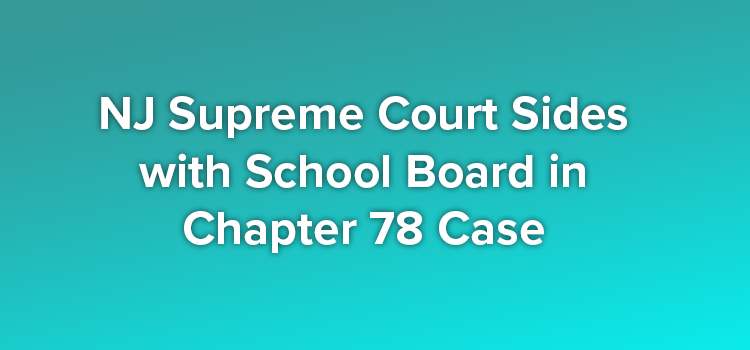In the Matter of Ridgefield Park Board of Education (A-2-19/083091) (Decided August 17, 2020), the Supreme Court of New Jersey held that the health insurance premium contribution rates paid by the Ridgefield Park Education Association’s members were preempted by statute and therefore non-negotiable. According to the state’s highest court, PERC’s construction of Chapter 78 comports with the statute’s language and the Legislature’s stated objective to achieve a long-term solution to a fiscal crisis.

Facts of Matter of Ridgefield Park Board of Education
The case involves a dispute between the Ridgefield Park Board of Education (Board) and the Ridgefield Park Education Association (Association) concerning Board employees’ obligations to contribute to the cost of their health care benefits under Chapter 78.
The law prescribed annual increases in health care contributions over four years for those employed by a local board of education and required those employees to achieve full implementation of the increased contributions (Tier 4) in the fourth year after the statute’s effective date or, for employees already subject to a CNA, in the fourth year after the expiration of that agreement. Chapter 78 also provided that when an employer and its employees negotiated the next CNA after the employees in a bargaining unit reached full implementation of the share of the cost of health care premiums mandated by N.J.S.A. 52:14-17.28c, they would negotiate employee health care contributions as if that premium share were part of their previous CNA.
The Board and the Association negotiated a CNA covering 2011-2014 that went into effect three days after the Legislature enacted Chapter 78. The 2011-2014 CNA expired before the employees achieved full implementation of the premium share set forth in N.J.S.A. 52:14-17.28c (Tier 4). After the 2011-2014 CNA expired, the Board and the Association negotiated a CNA covering 2014-2018, which, like its predecessor, stated that employees shall contribute 1.5% of their salary towards health insurance or the minimum set forth by statute, regulation, or code.
During the 2014-2015 school year, the employees contributed to the cost of their health care at the full premium share required by N.J.S.A. 52:14-17.28c (Tier 4). The Board and the Association disputed Chapter 78’s impact on employee contributions for the CNA’s remaining three years. The Board contended that Chapter 78 preempted any negotiated term for those contributions and that the Association’s members were required to contribute to their health benefits at the Tier 4 level for the duration of the CNA. The Association contended that Chapter 78 did not preempt the 1.5% contribution rate set forth in the 2014-2018 CNA.
The Board and the Association petitioned PERC for a scope-of-negotiations determination. PERC held that the health insurance premium contribution rate set forth in the 2014-2018 CNA was preempted by Chapter 78 and granted the Board’s request for a restraint of binding arbitration as to that issue. The Appellate Division reversed, concluding that adherence to Chapter 78’s plain language would bring about an “absurd result” contravening legislative intent, and required the employees to contribute only 1.5% of their salaries for the three contested years.
NJ Supreme Court’s Decision in Matter of Ridgefield Park Board of Education
The New Jersey Supreme Court reversed. It agreed with PERC’s determination that the health insurance premium contribution rates paid by the Association’s members were “preempted by statute” and therefore non-negotiable. As Justice Patterson explained:
We recognize a legitimate argument that N.J.S.A. 18A:16-17.2 makes clear that when employees reach the Tier 4 contribution level in the first year of a CNA, they must continue to contribute at that level until they negotiate a successor CNA providing for a lower rate of contribution, and that successor CNA goes into effect. When the statutory language is considered in conjunction with Chapter 78’s purpose and legislative history, that legislative intent is plain.
In reaching its decision, the court acknowledged that the Legislature did not expressly discuss the scenario in which the employees reached “full implementation” of the premium share with three years remaining in the term of their current CNA. However, the court further concluded that the Legislature implicitly addressed the setting of this case, by making the Tier 4 contribution rate the status quo from which a successor CNA would be negotiated. “Moreover, nothing in the statute authorizes an immediate reduction of employee health care contribution rates to their pre-Chapter 78 levels,” Justice Patterson wrote. “To the contrary, the Board submits, N.J.S.A. 18A:16-17.2 provides that once achieved, Tier 4 contribution levels are to remain in effect unless and until the parties negotiate lower health insurance premium contribution rates in the next CNA.”
The New Jersey Supreme Court went on to conclude that to the extent that N.J.S.A. 18A:16-17.2 leaves any ambiguity as to legislative intent, the legislative history of Chapter 78 resolves that ambiguity. “It demonstrates that the Legislature viewed public employee health care costs to present a fiscal crisis and that it acted to provide a long-term solution to that crisis,” Justice Patterson wrote. “The legislative history bolsters the Board’s argument that the Legislature intended that Tier 4 contribution rates would remain in effect for the duration of the term of the CNA in effect when the employees reached ‘full implementation.’”
Lastly, the New Jersey Supreme Court did not share the Appellate Division’s view that PERC’s interpretation of the statute gives rise to an absurd result. “N.J.S.A. 18A:16-17.2’s impact on employee health benefit contributions based on the timing of a given CNA is not an ‘absurd result’ warranting a departure from the statute’s terms,” Justice Patterson wrote. “The Legislature has the authority to make judgments about how best to achieve its objectives, subject to constitutional constraints.”
